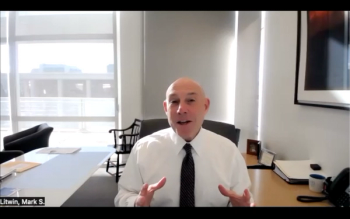
Success is built on a string of failures
The author’s career shortcomings are lessons in academic pursuit, leadership, and more.
Academic success is defined by rank, number of publications, grants, leadership in professional organizations, and peer recognition. Less recognized is the string of failed trials, rejections, and-even more important-personal sacrifices to achieve that success. The net balance is often recognized too late to recoup the losses. If you are lucky, an opportunity presents midway through your career to balance the two sides or curtail the desire to succeed at any cost.
This is an account of all my professional failures, as personal ones are for only those who need to forgive. I offer it not as self-criticism but as a handful of lessons for others to learn from.
Failure to train for academic pursuit
The medical school training in India did not prepare me for an academic career. The training was rich in clinical learning but poor in accounting for outcomes, basic research, statistics, and writing. It came only during and after fellowship and association with Dr. Arthur Smith, who started me on my publications. Seeing my name in print was heady, and after a while it became a necessity. Only late in my career did it become a habit. Many helped me write, but what helped most were the rejections from journals that stoked my passion to succeed.
Also see -
What lesson did I learn? Statistics is important, and writing skills are invaluable. Mastering the search engines and reference tools is automatic for today’s learners, but few pursue beyond Google and in-depth reading is becoming rare.
Failure in writing grants and IRB
It took many years before I achieved my cherished goal of receiving grant funding. Industry trials were the early successes but led me away from the serious science of grant writing. It is a skill acquired best by writing for institutional review board approvals and seeking grants as a student or resident.
Independent, peer-reviewed small grants are far more valuable than large, multicenter device grants. While I valued the opportunity to participate in all the trials, it certainly delayed the scientific pursuit. Zigzagging or changing course of research becomes the path that pursues the dollars; strict, goal-oriented scientific pursuit is a hard road with a very low chance of funding. Team science is an approach that should come early in life rather than late, as it came to me. Multiple failures to earn a good score in applying for NIH grants were based on solitary pursuit. Partnering with PhD colleagues and other disciplines led to eventual success.
Thus, it may be worthwhile to piggyback with other successful researchers before you pursue independence. The average age for an RO1 grant in urology is well past 50. To sustain your interest in research until then, you need to find pathways to have clinical dollars or institutional support.
Next:
My biggest regret is not personally keeping track of my surgical experience from the beginning. So many opportunities were lost in not being able to show trends, measure outcomes, and publish a plethora of data from prospective records. Retrospective studies are dissatisfying and poor in quality. When starting, no one envisions the need for data and in hindsight there are many regrets. Through helping establish the AUA AQUA Registry, I wish to avail others of the opportunity.
Failure to be objective in device trials
Being asked to be a principal investigator or participate in a device trial is seductive, whereas not being asked is dispiriting and depressing. In academic life, you want to be on the cutting edge. Failure lies in not being objective and not being critical early in trials. Everyone in the group wants to be positive, as being critical can be viewed as not being a team player or worse, being taken off the team.
As I look back, the number of trials that never brought a product to market or did not survive was considerable. I gained a valuable lesson, which was to be honest with the results and present/publish negative data. Credibility is way more important than a publication that is discredited later. My relationships with other trial participants, industry, and clinical coordinators were a major plus in virtually every trial in which I participated.
Read:
The list of trials that did not make it to the market or disappeared is much longer list than the list of those that remain successful. Endopyelotomy, the UroLume device, balloon dilation of the prostate, alcohol injection of the prostate, bulking agents, and cell therapy all have a string of publications attached to them. Mesh use has consumed my last decade. By my own account, I have more publications on trials that are no longer around.
Failure to assist in the desire to lead
As surgeons, we want to operate. It took some knocks early in my surgical career to learn the valuable lesson that the best surgeon is the one who can assist with and anticipate the next step of the primary surgeon. It is also true in the academic community, be it in the department or in the society, that working behind the scenes is not considered valuable, as everyone seeks a title.
I have seen too often a lack of vision or efficacy after obtaining the title if you have not paid your dues. Surgical training is the same, as the basic tenet of assisting is lost in the millennial pursuit of duty hours and not wanting to be a second assist for the sake of learning.
Failure to recognize those who make you look good
Again, the team science exists not only in research but in daily work. All around you are people who you do not acknowledge often enough and who make or break you. I learned many surgical tricks from the surgical assistants in the OR and not from the busy surgeons who did not have the time to teach. Success in societies was all due to the outstanding help I received from individuals who rarely received accolades.
Students, residents, and fellows are your biggest assets if you allow them to be. Since life is a two-way street, I could have done better by spending quality time teaching them. I failed when I heard my residents and fellows describe me as “intimidating.”
The biggest sacrifice is family time. I sometime resent the junior faculty who want to have a work-life balance but still want the same fruits of those who spent countless hours pursuing the mythical dream of academic success. But as I get older, I ask myself: Are they wrong, or was I wrong?
I was lucky in more than one way. Number one was my family who stood by me despite my taking them for granted. The other was the divine intervention that led me to pursue the path of serving those in need and, finally, friends who were there when I needed them.
To quote Winston Churchill: “Success consists of going from failure to failure without loss of enthusiasm.”
Newsletter
Stay current with the latest urology news and practice-changing insights — sign up now for the essential updates every urologist needs.






